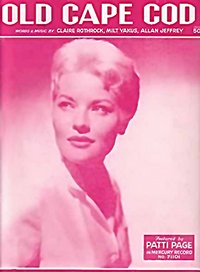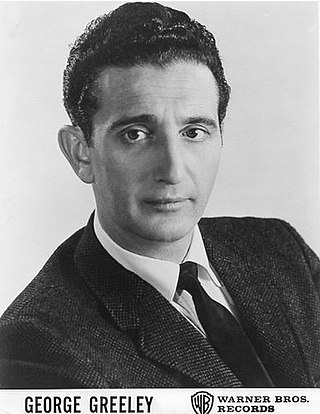Related Research Articles

"Lost in Love" is a song recorded by the British/Australian soft rock duo Air Supply. The song was written by group member Graham Russell. The original version of the song appeared on the Life Support album in 1979 and was released as a single in Australia, reaching number 13 on the Kent Music Report. The group re-recorded the song for the album of the same name in 1980 and this version was released as a single in the US, reaching number 3 on the Billboard Hot 100.
"Around the World" is the theme tune from the 1956 movie Around the World in 80 Days. In the film, only an instrumental version of the song appeared, although the vocal version has become the better known one. The song was written by Harold Adamson and Victor Young; Young died in 1956, several weeks after the film's release, and he received the Academy Award for Best Music, Scoring of a Dramatic or Comedy Picture posthumously. Young's orchestral version was a #13 hit on the Billboard charts in 1957. The recording by Bing Crosby was the B-side of the Victor Young version in 1957, on Festival SP45-1274 in Australia, and was a joint charting success.

"Here in My Heart" is a popular song written by Pat Genaro, Lou Levinson, and Bill Borrelli, first published in 1952.
"I Believe" is a popular song written by Ervin Drake, Irvin Abraham, Jack Mendelsohn and Al Stillman in 1953. The most popular version was recorded by Italian-American singer Frankie Laine, and spent eighteen weeks at No. 1 on the UK Singles Chart.
"It's April Again" is a popular song that first appeared in the 1952 film Moulin Rouge. It became a No. 1 hit in the UK Singles Chart when recorded by Mantovani. The music for the film was written by Georges Auric; the original French lyrics were by Jacques Larue, with the English words by William Engvick. The Auric-Engvick song was published in 1953.

"Hold Me, Thrill Me, Kiss Me" is a song written by Harry Noble and originally performed by Karen Chandler in 1952. It has been re-recorded several times since then, the most notable covers being by Mel Carter in 1965 and Gloria Estefan in 1994.
"And That Reminds Me", also known as "My Heart Reminds Me", is a popular song.

"Old Cape Cod" is a song written by Claire Rothrock, Milton Yakus and Allan Jeffrey that was published in 1957. The single, as recorded by Patti Page, became a gold record, having sold more than a million copies. Hailed by Cape Cod natives as the "unofficial Cape Cod Anthem, if ever there was one," the song has been credited with "putting the Cape on the map" and helping to establish Cape Cod as a major tourist destination.
"Heartaches by the Number" is a popular country song written by Harlan Howard, and published in 1959. The sheet music was a best seller in both the US and Britain in January 1960.
"Prisoner of Love" is a 1931 popular song, with music by Russ Columbo and Clarence Gaskill and lyrics by Leo Robin.

"Who's Sorry Now?" is a popular song with music written by Ted Snyder and lyrics by Bert Kalmar and Harry Ruby. It was published in 1923, when Isham Jones had a major hit with it. Other popular versions in 1923 were by Marion Harris, Original Memphis Five, Lewis James, and Irving Kaufman.
"I Only Have Eyes for You" is a romantic love song by composer Harry Warren and lyricist Al Dubin, written for the film Dames (1934) when Dick Powell introduced it. Several successful recordings of the song were made in 1934; later, there were charted versions by The Flamingos (1959) and Art Garfunkel (1975).
Paul Evans is an American rock and roll singer and songwriter, who was most prominent in the 1950s and 1960s. As a performer, he had hits with the songs "Seven Little Girls Sitting in the Backseat", reaching No. 9 on the Billboard Hot 100 in 1959), "Midnight Special" and "Happy-Go-Lucky Me".
"Love Letters in the Sand" is a popular song first published in 1931. The music was written by J. Fred Coots and the lyrics by Nick Kenny and Charles Kenny. Ted Black and His Orchestra, with vocalist Tom Brown, had the first major hit recording of the song in 1931. Pat Boone had a major hit with the song in 1957.

"You Light Up My Life" is a ballad written by Joseph Brooks, and originally recorded by Kasey Cisyk for the soundtrack album to the 1977 film of the same title. The song was lip synced in the film by its lead actress, Didi Conn. The best-known cover version of the song is a cover by Debby Boone, the daughter of singer Pat Boone. It held the No. 1 position on the Billboard Hot 100 chart for ten consecutive weeks in 1977 and topped Record World magazine's Top 100 Singles Chart for a record 13 weeks.

"Tie Me Kangaroo Down, Sport" is a song written by Australian singer Rolf Harris in 1957 which became a hit around the world in the 1960s in two recordings. Inspired by Harry Belafonte's calypsos, most noticeably "The Jack-Ass Song", it is about an Australian stockman on his deathbed.
"Blue Hawaii" is a popular song written by Leo Robin and Ralph Rainger for the 1937 Paramount Pictures film Waikiki Wedding, starring Bing Crosby and Shirley Ross. Crosby recorded a version with backing by Lani McIntyre and His Hawaiians, which was released in 1937 as the B-side of "Sweet Leilani." This reached the No. 5 spot in the charts of the day during a 13-week-stay
"Mexico" is the title of a 1961 instrumental recording by American bassist, orchestra leader, and Rockabilly Hall of Fame member Bob Moore. The song was written by Boudleaux Bryant. Moore was a noted session musician in the 1950s and 1960s who worked with Elvis Presley, Pat Boone, Roy Orbison, and Brenda Lee, among others.

George Greeley was an Italian-American pianist, conductor, composer, arranger, recording artist and record producer who is known for his extensive work across the spectrum of the entertainment industry. Starting as an arranger and pianist with several notable big bands in the 1940s, he segued into the Hollywood radio scene, working on several nationally broadcast variety programs. After conducting an Army Air Force Band during World War II, he was hired by Columbia Pictures as a staff pianist and orchestrator. He worked as pianist on several hundred motion pictures, worked with many famous composers orchestrating their soundtrack compositions, and created original compositions of his own in several dozen movies. It was Greeley's hands that performed the piano parts that Tyrone Power mimed in The Eddy Duchin Story. Concurrent with his work at Columbia Pictures, George Greeley also worked at Capitol Records as music director, pianist, and conductor for many artists such as Gordon MacRae, Jane Powell, Jo Stafford, Frankie Laine, and Doris Day. He was hired in the late 1950s by the newly established Warner Brothers Records. George Greeley arranged, orchestrated and performed as primary artist for a series of hit recordings entitled "Popular Piano Concertos." As music tastes changed in the late 1960s, Greeley had already moved into television, composing themes and music for popular TV series like My Favorite Martian,The Ghost and Mrs. Muir,Nanny and the Professor, and Small Wonder. He performed as featured piano soloist and as guest conductor in concert appearances around the world. He died from emphysema at age 89 in Los Angeles, California.

During his career as a singer and composer, Pat Boone released 63 singles in the United States, mostly during the 1950s and early 1960s when Boone was a successful pop singer and, for a time, the second-biggest charting artist behind Elvis Presley according to Billboard. Boone has had over 25 singles reach the top 20 on the U.S. singles charts, including the number-one hits "Ain't That a Shame" (1955), "I Almost Lost My Mind" (1956), "Don't Forbid Me" (1957), "Love Letters in the Sand" (1957), "April Love" (1957), and "Moody River" (1961). "I'll Be Home" (1956) reached No. 1 in the UK. He set a Billboard record, which he still holds, for spending 220 consecutive weeks on the charts with one or more songs each week.
References
- ↑ Whitburn, Joel (2004). The Billboard Book of Top 40 Hits (8th ed.). New York: Billboard Books. p. 75. ISBN 0-8230-7499-4.
- ↑ "Pat Boone - April Love". lovvin.com. Retrieved 14 February 2013.
- ↑ "Discogs.com". Discogs.com. 1961. Retrieved December 13, 2017.